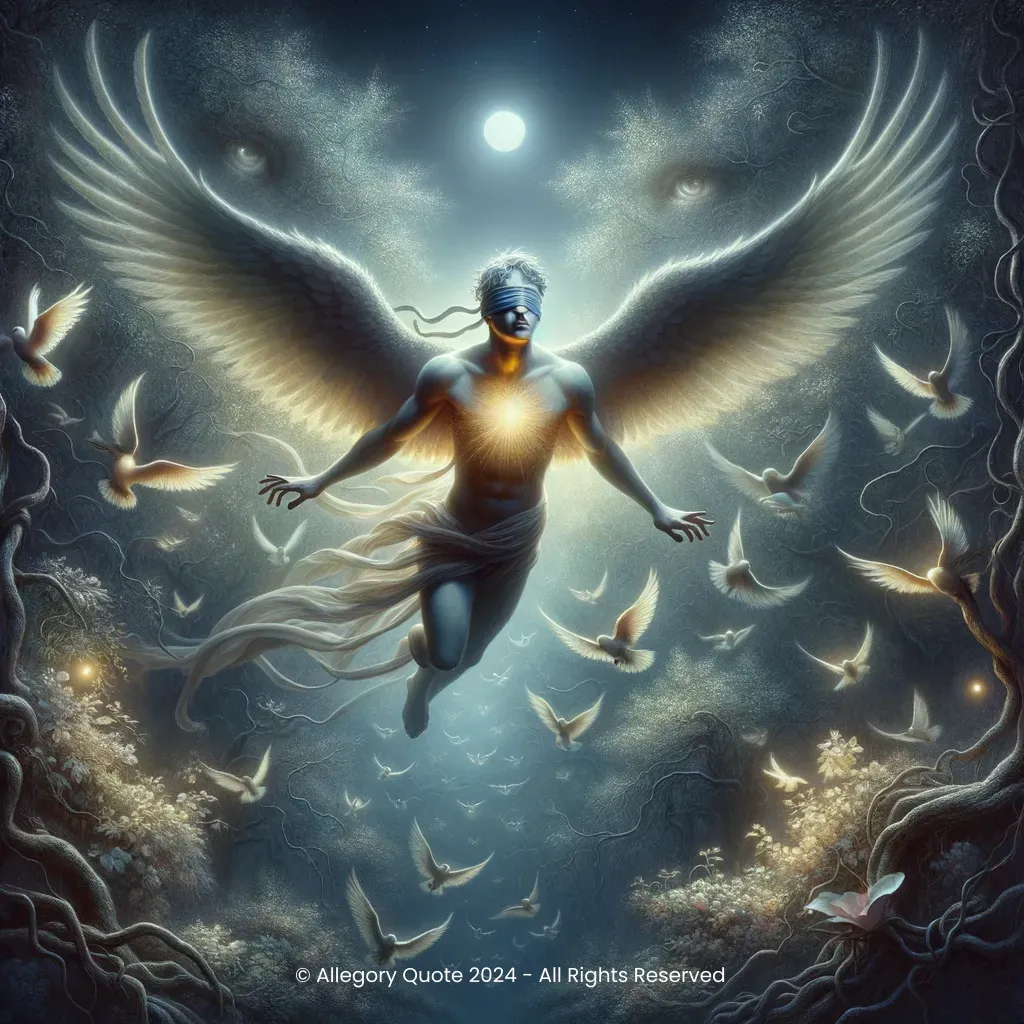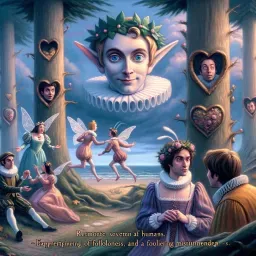”Love looks not with the eyes, but with the mind;
and therefore is winged Cupid painted blind“

0
0
0
0
- Meaning
- In this phrase, Shakespeare poetically explores the nature of love, suggesting that true love is not based on physical appearance but on the mental and emotional connections between individuals. By using "the mind" rather than "the eyes," Shakespeare emphasizes that love transcends superficial qualities and instead sees the deeper essence of the beloved. The reference to Cupid, the Roman god of love often depicted as blindfolded, reinforces the idea that love is blind to physical appearances and instead is guided by emotions and thoughts.
- Allegory
- The image elements include a blindfolded Cupid to illustrate the proverb's assertion that love does not rely on physical sight. The dreamy nocturnal forest setting evokes enchantment and otherworldliness, aligning with the fantastical elements of "A Midsummer Night's Dream." The unseen eyes represent those who understand love through emotional and mental connections rather than visual appearances. The glowing light from Cupid's heart emphasizes the inner beauty and emotional depth associated with true love. The soft moonlight and intricate forest elements symbolize the complex and interwoven nature of deep emotional connections. Together, these elements reflect the profound and enduring message of the phrase.
- Applicability
- The teaching of this phrase can be applied to personal life by encouraging individuals to look beyond superficial attributes when forming relationships. It suggests valuing deeper qualities such as character, personality, and emotional connection over transient physical beauty. This approach can lead to more meaningful and lasting relationships.
- Impact
- This phrase, like much of Shakespeare's work, has had a lasting impact on literature and popular culture. It encapsulates the timeless and often irrational nature of love, making it a frequently cited and discussed quote in various contexts. It has inspired countless discussions about the depths of emotional connections versus surface-level attractions and continues to be relevant today in discussions about what constitutes true love.
- Historical Context
- "A Midsummer Night's Dream" was written in the late 16th century, with most scholars dating its composition between 1595 and 1596. The play is set in a mythological Athens and a magical forest, blending elements of classical mythology and Elizabethan culture. This period was marked by a flourishing of arts and literature in England, often referred to as the English Renaissance.
- Criticisms
- While the phrase is widely appreciated for its poetic beauty, some may argue that it romanticizes a notion of love that might overlook other important aspects such as physical attraction and compatibility. The idea that "love is blind" can sometimes be critiqued for suggesting that love should ignore potential red flags or differences that are significant in a relationship.
- Variations
- While the phrase itself is a unique poetic creation by Shakespeare, the concept of love transcending physical appearance is a common theme across many cultures. For instance, in Buddhism, the idea of loving-kindness (metta) encompasses goodwill and benevolence that goes beyond physical attributes. Similarly, in Sufism, spiritual love is often emphasized over corporeal love, focusing on the inner beauty of the soul.
-

The golden age is before us, not behind us.
-

Double, double toil and trouble; fire burn and cauldron bubble.
-

I am one who loved not wisely but too well.
-

Lord, what fools these mortals be!
-

Get thee to a nunnery.
-

The better part of valor is discretion.
-

If you prick us, do we not bleed?
-

My tongue will tell the anger of my heart, or else my heart concealing it will break.
-

The robbed that smiles, steals something from the thief.
-

Frailty, thy name is woman!
-

As merry as the day is long.
-

Friends, Romans, countrymen, lend me your ears.
No Comments